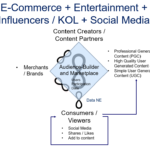In this podcast, Jeffrey Towson discusses whether ByteDance, the Chinese tech giant behind TikTok, can breach Alibaba’s dominance in the Chinese ecommerce market. He argues that ByteDance has a number of advantages, including its large user base, its data-driven approach to marketing, and its ability to innovate quickly. However, he also acknowledges that Alibaba has a number of strengths, including its strong infrastructure, its deep relationships with merchants, and its brand recognition. He concludes that it is too early to say whether ByteDance will be able to challenge Alibaba, but that the battle between the two companies is one to watch.









